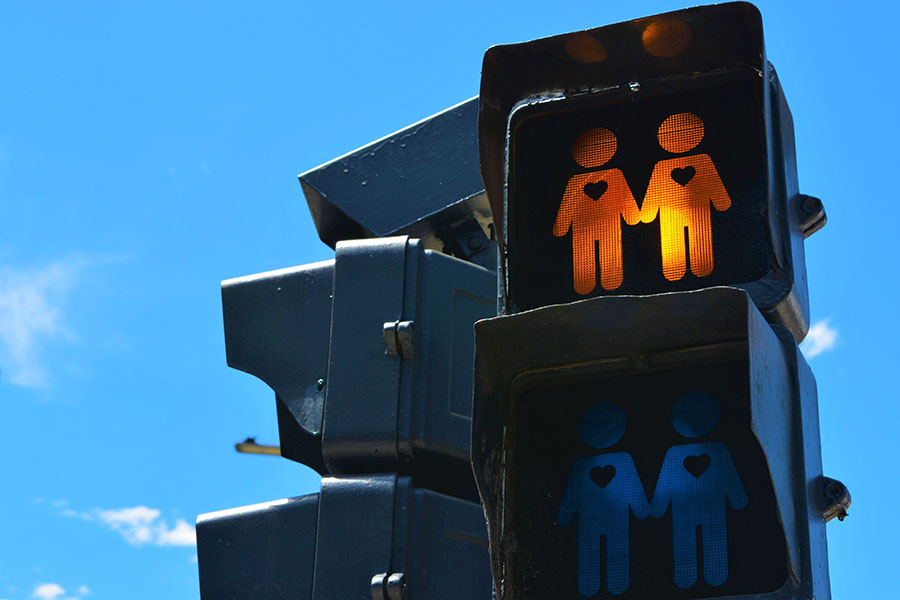Finding a firm that can truly represent you and your family’s needs during litigation is a priority for clients from all walks of life, but the importance for LGBTQ+ families is even greater. Aside from the sensitivities of making sure your law firm is queer-friendly, there are also some fundamental differences in dealing with LGBTQ+ family law, both in terms of the law itself and the situations rainbow families are more likely to find themselves in. Here is a quick tour of 3 differences that may apply to you and your family.
1. Marriage and Divorce
Since 2015, same-sex marriage has been legal in all 50 states, cementing equal marriage rights (and divorce rights) for couples of all genders across the country. However, while national unity on marriage and divorce only happened a decade ago, certain states legalized marriage as early as 2004.
As a result, LGBTQ+ divorce can be a complex topic legally speaking, especially for those marriages that happened pre-2015 (when Obergefell came into effect and legalized marriage unilaterally in the United States) or involving children and custody across state boundaries, particularly given the recent bills passed in Florida and Texas.
Custody rights can prove technically challenging, particularly for divorcing couples who have conceived through assisted reproduction (including surrogacy and in vitro fertilization). Establishing parental rights will often rely on pre-existing pieces of documentation, such as pre-birth orders and adoption papers. Marital presumption can also come into play for children born to married couples, although for LGBTQ+ families, this will not be relevant for children who were born before the legalization of same-sex marriage and therefore could not be born to married parents (in California, same-sex marriage was legalized in 2013).
2. Gender (Names and Pronouns)
For trans members of the LGBTQ+ community, there can be several considerations when it comes to family law that do not apply to their cisgender counterparts. Firstly, there is the consideration that the prior name disclosure required for litigation may unintentionally ‘out’ transgender people who have not shared their transition publicly, which may require an extra level of care and support from your legal team.
Pronouns can also be an additional source of anxiety for LGBTQIA+ people during litigation. The legal system can feel outdated at times, with a number of laws traditionally having been written exclusively in ‘he/him’ pronouns. While times are changing and the legal system is improving, it is essential to ensure that your lawyer is aware of the pronouns you wish to use during proceedings, particularly for trans or non-binary individuals with they/them pronouns who may otherwise be misgendered.
Another common logistical factor to consider for people whose gender has changed since birth is paperwork. Documents issued in deadnames or under a different gender to that which the person identifies can not only be a cause of great distress and dysphoria when referred to any kind of legal proceedings but can require extra bureaucratic care and time to sort. Hiring a firm that understands the additional challenges you may face is crucial in both getting things sorted and ensuring that you are kept updated on realistic timelines.
3. Domestic Violence
Certain members of the LGBTQ+ community are at greater risk of domestic violence. A CDC study showed that 61% of bisexual women have experienced physical or sexual violence or stalking from their current or previous partners, and another study showed that approximately 60% of trans people have experienced domestic violence in the home (from either their partners or other members of the family).
However, the wider understanding of LGBTQ+ domestic violence is often quite limited, and services and legal help are often targeted toward heterosexual couples. A US Department of Justice document from 2000 outlining the difficulties LGBTQ+ people face in gaining access to domestic violence support and protection in California may have improved awareness of access to services, but specific services with a contextual understanding of the intricacies of LGBTQ+ domestic violence are still not as widely available.
There is also the consideration that discrimination against the LGBTQIA+ community may be a unique catalyst in domestic violence situations. Homophobic and transphobic abuse related to the victim’s sexuality or gender transition can require an additional layer of sensitivity and understanding in representing the case. Having a firm with a history and knowledge of representing these cases is therefore extra important.
While some of the differences are legal and some are situational, getting legal advice from a firm that shows a strong dedication to understanding LGBTQ+ families can be crucial, whether you find yourself taking legal action or are looking to avoid it in the future. For more questions about family law for LGBTQ+ families in California and what this might look like in your situation, we want to hear from you. Call Provinziano & Associates at (310) 820-3500, or get in touch online, and let us help protect your family rights.



